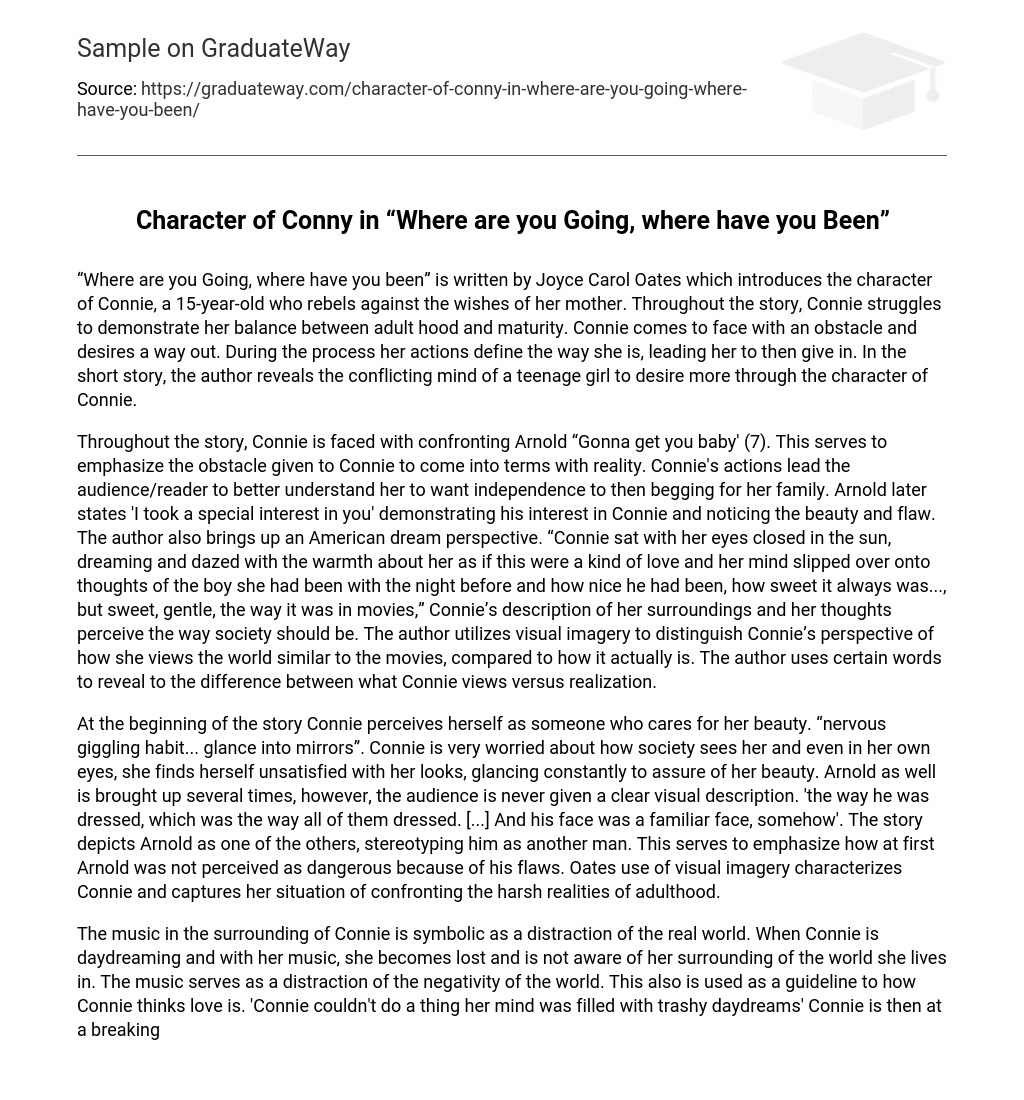“Where are you Going, where have you been” is written by Joyce Carol Oates which introduces the character of Connie, a 15-year-old who rebels against the wishes of her mother. Throughout the story, Connie struggles to demonstrate her balance between adult hood and maturity. Connie comes to face with an obstacle and desires a way out. During the process her actions define the way she is, leading her to then give in. In the short story, the author reveals the conflicting mind of a teenage girl to desire more through the character of Connie.
Throughout the story, Connie is faced with confronting Arnold “Gonna get you baby’ (7). This serves to emphasize the obstacle given to Connie to come into terms with reality. Connie’s actions lead the audience/reader to better understand her to want independence to then begging for her family. Arnold later states ‘I took a special interest in you’ demonstrating his interest in Connie and noticing the beauty and flaw. The author also brings up an American dream perspective. “Connie sat with her eyes closed in the sun, dreaming and dazed with the warmth about her as if this were a kind of love and her mind slipped over onto thoughts of the boy she had been with the night before and how nice he had been, how sweet it always was…, but sweet, gentle, the way it was in movies,” Connie’s description of her surroundings and her thoughts perceive the way society should be. The author utilizes visual imagery to distinguish Connie’s perspective of how she views the world similar to the movies, compared to how it actually is. The author uses certain words to reveal to the difference between what Connie views versus realization.
At the beginning of the story Connie perceives herself as someone who cares for her beauty. “nervous giggling habit… glance into mirrors”. Connie is very worried about how society sees her and even in her own eyes, she finds herself unsatisfied with her looks, glancing constantly to assure of her beauty. Arnold as well is brought up several times, however, the audience is never given a clear visual description. ‘the way he was dressed, which was the way all of them dressed. […] And his face was a familiar face, somehow’. The story depicts Arnold as one of the others, stereotyping him as another man. This serves to emphasize how at first Arnold was not perceived as dangerous because of his flaws. Oates use of visual imagery characterizes Connie and captures her situation of confronting the harsh realities of adulthood.
The music in the surrounding of Connie is symbolic as a distraction of the real world. When Connie is daydreaming and with her music, she becomes lost and is not aware of her surrounding of the world she lives in. The music serves as a distraction of the negativity of the world. This also is used as a guideline to how Connie thinks love is. ‘Connie couldn’t do a thing her mind was filled with trashy daydreams’ Connie is then at a breaking point and becomes aware of it. She comes into terms with the idea of how the world truly is and does not know how to react. This also foreshadows the ending of the story and how Connie is later seduced by Arnold.
The beginning of the story when Connie first interacts with Arnold, his words towards Connie is not taken seriously. Later, in the story Connie is confronted by Arnold, this demonstrates the use of foreshadowing. The tone throughout the story shifts due to Connie’s actions. Arnold at a point threatens Connie leaving her with a huge decision and this is when the audience realizes that Connie is not capable of adulthood. Connie herself as well learns that her actions lead her to the situation she was put into.
Connie at a young age is at a stage of rebellion. She struggles with finding a way to identify herself through the eyes of society. The demonstration of literary devices characterizes Connie as a typical teenage girl capturing her situation as something that can happen to any other person. Connie’s situation depicts her from her family since her interest in wanting to grow up and not be judged by the rest of her family since her flaws differ from her sister.





